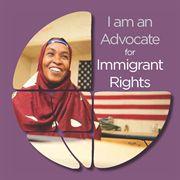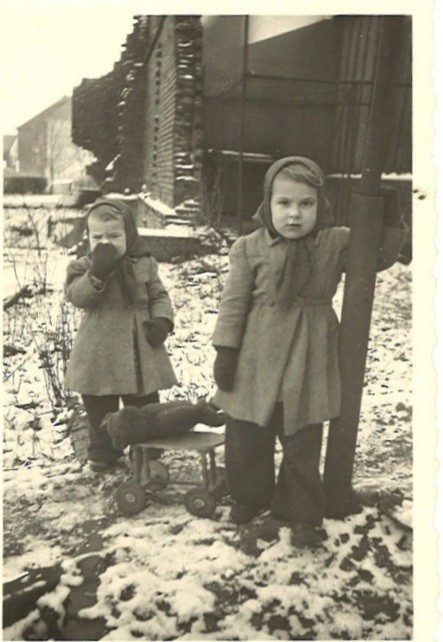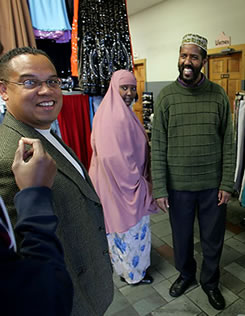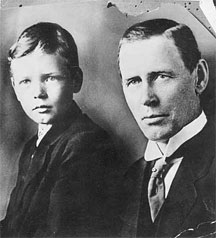Immigration: Then and Now
Alma and Reinhild Rauhaus among the ruins of their ancient German city, 1952
Coats made from fallen soldiers’ uniforms
Joined by fourteen potential jury members, I sat in a jury box this spring and answered questions to determine my competence in deciding the amount of damages in a traffic accident case. It was easy enough to get past the “tell us about yourself” introduction, for I had long ago learned to be cautious and evasive when describing myself. Fortunately, place of birth was not asked. Toward the end of the questioning period, one of the attorneys inquired of everyone whether he or anyone in his family had ever served on a police force or in the armed forces. I was the last to be asked and uneasy about this unexpected question. Finally, after reassuring myself that WW II was ancient history and Americans more sophisticated than they used to be, I related my family’s military history in a few short sentences. Both of my parents had served in WW II. My father, Wolfgang, had been captured in France and sent to a POW camp in Texas, where he spent two years picking cotton. My mother, Ute, was a member of a Third Reich girls’ organization, the Bund Deutscher Mädchen, where, as an eighteen year old, she commanded a group of search light operators during the last year of the war. My maternal grandfather, a police official, served in both world wars. In the silence that followed the few words of my relatives’ military service long ago, I felt the dread of ethnic condemnation, which I had so often experienced when I was obliged to reveal that I was an immigrant German.
THEN
In 1952, my mother, my younger sister, Reinhild, and I set sail from Bremerhaven, Germany for Halifax, Nova Scotia. From there the three of us boarded a train which took us half way across the country to Winnipeg, Manitoba. Wolfgang had left months earlier to find employment and housing in Winnipeg. Though a degreed engineer, Wolfgang could only find work butchering fowl at a turkey slaughtering plant. For the first year of their residence, until Wolfgang could locate more suitable employment, the family lived in a tenement. Both of my parents had learned French and Latin in school. Ute spoke no English, whereas Wolgang had acquired rudimentary English in POW camp.
Wolfgang’s reason for emigrating hinged on an unpleasant family matter. While Wolfgang served four grueling years in the war and lost his first wife by allied attack, his older brother had escaped military service by managing a family business deemed essential to the war effort. Before Wolfgang had returned from POW camp, my paternal grandfather suddenly died of a heart attack and without a will. The provincial court awarded the family business and the substantial property holdings to the older son.
Wolfgang would have preferred to have returned to Texas, with its mild climate and many residents of German ancestry. But because the family had neither relatives nor an employer sponsor in the country, immigration to the United States was not possible. Canada, though, had dropped its designation of Germans as enemy aliens in 1952 and had begun to permit their entry. Wolfgang planned to remain in Canada only until it was possible to move further south, though definitely to a place where the majority of residents were of northern European descent.
Wolfgang and Ute recognized the need to learn English rapidly. Wolfgang, who worked with English speakers all day, quickly spoke almost flawless English with a slight British accent acquired from the British immigrants with whom he came in contact. Ute soon obtained a public library card and borrowed children’s books which she read aloud to the children, and together they deciphered the stories’ meanings. When I entered kindergarten I spoke only German. Though I didn’t utter a word of either language in school during that year (I was left undisturbed to listen). By first grade I spoke quite fluent English. At home my family continued to speak exclusively German. However, Reinhild and I were taught never to speak German in public. Wolfgang and Ute considered conversing in a language, which those who heard them might not be able to understand—extremely rude. If we did not know how to express something in English, we were to be silent. In addition, Reinhild and I were expected to be paragons of decorum in public, because after all, Canada had extended a great courtesy to the family by permitting them to reside in the country and were to serve as examples of well-bred German children.
Within a year Wolfgang was hired as an electrician by the local municipal water and electric company. The family moved from the tenement into improved housing and began to make friends among immigrants and Canadians. Ute resumed her pharmacy studies. At home Reinhild and I practiced singing, “Oh Canada,” and “God Save the Queen,” and appeared to be developing into enthusiastic members of the Commonwealth. After five years in Winnipeg, residing there long enough to qualify for Canadian citizenship, Wolfgang received a job offer in the United States. Five hundred miles south of Canada, an American company unable to find an adequate number of capable engineers in the area, expanded its search, located Wolfgang, and agreed to sponsor our family for permanent residency status.
So we immigrated again, twice in five years. Language was no longer an impediment; the number of frost-free days increased from ninety to a few more, and Wolfgang finally had the work he wanted. By living very frugally we were now able to visit Germany occasionally. Every time we flew over we noticed fewer men with missing arms and legs. How fortunate, I thought as a ten year old, that the family was at home in two countries. Not only did we have Halloween, a modest American car, a small house with sufficient bathrooms, and streets without rubble on the western side of the Atlantic. On the eastern side we possessed castles, cathedrals, marzipan, and our own language and people.
At the dinner table, comparisons between the US and Germany were often the subject of discussions. Wolgang and Ute were especially impressed by two American establishments: public libraries and state and national parks. How commendable of a resourceful Scottish immigrant (Andrew Carnegie) to bequeath millions of dollars for the creation of a nationwide system of free and excellent libraries! On drives through the farm country of Minnesota, Wolf and Ute located the libraries in small towns everywhere, each an architectural gem. They marveled at Carnegie’s largess and the civic mindedness of local governments to continue to financially support them. Likewise, Wolf and Ute appreciated the vast and beautiful publicly funded state and national parks available to all. As a city child, Ute had enjoyed camping expeditions in Germany, which the League of German Girls arranged. That the American government had purchased immense tracts of land, and impeccably maintained them for all citizens, was surely evidence of its concern for the public good.
At the same time, Wolfgang and Ute became increasingly alarmed by the anti-German propaganda which was growing in the 1960s. Why did the Hollywood-contrived WWII “news” reels appear on TV with ever greater frequency? Did the culture of the Holocaust also originate in Hollywood and what was its purpose? When Wolf’s co-workers became ever more aloof, he and Ute considered returning to Germany.
NOW
While waiting at Newark airport for a flight to the Twin Cities recently, I overheard a conversation between two American Black airport employees who were assisting designated foreign travelers. Receiving assistance was a large Arabic-speaking Somali family consisting of one man, two young women, and the many children of each wife. While distributing lunch items to the family of Somalis, the Black airport employees expressed their disapproval of the Somali travelers. Why was “the government” bringing these people here and giving them “everything”— free flights, food, health care and housing, while American citizens were struggling to survive? Shouldn’t the American government provide for its own people? Soon the Somali families, with the help of the airport personnel, boarded their plane to the Twin Cities, the Somalis’ new home.
In Minnesota, a state of a majority German/Scandinavian ethnic background, an influential organization, The Advocates for Human Rights, aggressively labors to aid non-European populations through national and international justice processes. With a powerful board containing members of the most prestigious Minnesota institutions and companies and a large staff of highly qualified attorneys, this organization monitors immigration-related legislation locally and throughout the US. It works to aggressively combat anti-immigrant sentiment and aggressively resettles large numbers of Third World immigrants into Minnesota. By appealing to the public’s “moral obligations” regarding human rights. It has established an efficient and highly effective organization aimed at bringing in large numbers of third world immigrants, to monitor immigrant-related legislation locally and nationally, to arrange state-sponsored services for the immigrants’ comfort and security, and to provide pro-immigration materials for schools.
 “The Advocates” provides pro-immigration school resources to help counter “myths” about immigration and to support “welcoming communities” such as the churches and the various philanthropic and humanitarian organizations. Through its online immigration resource center “The Advocates” provide up-to-date information and resources for educators, and community members through fact sheets, curricula, action alerts, policy updates, and immigration-related news and events. “The Advocates” insure that immigrants and refugees have available free and low cost legal services throughout Minnesota and access to subsidized housing, health care, nutrition assistance and cash.
“The Advocates” provides pro-immigration school resources to help counter “myths” about immigration and to support “welcoming communities” such as the churches and the various philanthropic and humanitarian organizations. Through its online immigration resource center “The Advocates” provide up-to-date information and resources for educators, and community members through fact sheets, curricula, action alerts, policy updates, and immigration-related news and events. “The Advocates” insure that immigrants and refugees have available free and low cost legal services throughout Minnesota and access to subsidized housing, health care, nutrition assistance and cash.
“The Advocates” is assisted by vast numbers of volunteers – 50 volunteers for every staff member. Here is a sample of a volunteer invitation:
You can help stop harmful anti-immigrant legislation! The most effective way to have a voice at the state legislature is to form a relationship with your representatives as a trusted voice on immigration. Set up a meeting with your legislator or their staff, introduce yourself and your role in the community, and begin talking about your position on key immigration issues. Don’t let the forces of discrimination and fear win in Minnesota.
“The Advocates for Human Rights” formidable staff of immigration attorneys is determined to prevent MN legislators from enacting laws and setting public policies which follow the Arizona model. See http://www.energyofanation.org/education_immigration.html
In addition, the Advocates work to prevent the legislation of English-only laws. English-only laws, they argue, violate the rights of immigrants and discourage the integration of immigrant communities. To dissuade the public from supporting such language legislation, the Advocates characterize English-only supporters as being closely connected to anti-immigrant and “White supremacist” groups.
Among the local associations providing their resources to the MN Advocate for Human Rights are the following:
- Alliance for Fair Federal Immigration Reform in Minnesota (AFFIRM)
- American Immigration Lawyers Association (AILA)
- Asylum Working Group
- Coalition for Permanent Residency
- Human Rights Leadership Coalition
- Immigrant and Refugee Battered Women’s Task Force
- Immigrant Law Center of Minnesota
- Immigration Advocates Network
- Midwest Coalition for Human Rights
- Minnesota Global and Human Rights Education Network
- Minnesota Global Educators Network (MNGEN)
- Minnesota International Center.
- Physicians for Human Rights
- Jewish Community Action
The population of MN currently numbers about 5,300,000, including these recent aliens: Hispanics: 205,896; Hmong: 180,000; Somali: 100,000; Liberians: 30,000.
Of Minnesota’s 11,708 immigrants since 2006, the largest number has come from Africa. The State is fifth in the nation for number of African immigrants, behind only California, New York, Texas and Maryland. Liberians are the latest ethnic Africans to take up residency in Minnesota. Settled as temporary refugees they could potentially be returned to Liberia. However, Advocate lawyers have been successful in extending their stay since 2010 and are working on legislation to grant them permanent residency. In the meantime, Liberians receive state aid and their children attend Twin City schools. Failed comedian, but successful immigration advocate, the Jewish Minnesota Senator Al Franken has been especially active in promoting Liberian immigration.
Somali American votes were instrumental in electing Keith Ellison, left, the first Muslim elected to the US Congress,
and the first Black congressman from Minnesota.
Jewish organizations and activists, in fact, have been especially active in promoting Somali and Liberian relocation to Minnesota. (For the history of Jewish involvement in US immigration see here.)
Among the reasons masses of Third World aliens reside Minnesota is the existence of the state’s generous welfare benefits, originally established to benefit its native population. Like its Third World population, however, Minnesota’s entitlement programs have metastasized. In 1992, public welfare spending accounted for 15.2% of the Minnesota governments’ budget. It climbed to 16.7% in 1997 and 18.4 % in 2002.
Recently, nearly 25% of all state and local government spending in Minnesota went toward services that fall under the Census Bureau’s definition of welfare. Spending on highways was next at nearly 8%. Third was spending on police protection at 3.5%.
In order to afford vast entitlement programs for third world immigrants, states and municipalities across the country are cutting public services previously regarded as intrinsic to the American way of life. Throughout the U.S., deep cuts have already been made in public services essential to citizen well-being including in state parks and public libraries—two institutions which my parents so much admired. In California, for example, Jerry Brown recently announced plans to permanently close 70 of the state’s 278 parks at the end of the summer. In Georgia, park financing has been cut in half. Everywhere fees are rising while services are declining.
Public libraries are reporting similar cuts to their budgets. After experiencing a surge in public library use nationwide, the tough economy is forcing many branches to cut staff, hours and programming at a time when many cash-strapped people need them most. A shocking 72% of public libraries reported budget cuts this year; 43% cut staff as well. A new American Library Association survey found that in addition to significant state cuts in public library funding this year, there have been 17,000 library closures around the country. As in previous downturns, Americans turned to their libraries during the Great Recession for free children’s programming or to borrow books, movies and music. In 2008, when the economy was in freefall, a record 68 percent of Americans had a library card, and library visits and borrowing spiked as well.
The formerly outstanding public libraries of Minnesota have also cut budgets. Over the past three years the Minneapolis Public Library has cut one-third of its staff, sharply reduced library hours and closed three neighborhood branches.
For the St. Paul Public Library, cuts in Local Government Aid resulted in a 14% ($2 million) cut to its 2009 budget, closure of one branch library, cuts to hours in all libraries and a $400,000 cut to the books and materials budget. Not cut are expenditures for computers, usually occupied by immigrants. (See here and here.)
Incredibly, on July 2, 2011, Minnesota state government entirely shut down for nearly a month during which time many state services were no longer available to residents. Minnesotans could not purchase hunting and fishing licenses, visit the zoo, renew expired drivers licenses, or camp in state parks. Among the state parks closed was the 569 acre Charles Lindbergh Sr. State Park. Established in 1931 in memory of Minnesota Congressman Lindbergh Sr., who spoke out frequently in Congress against both the establishment of the Federal Reserve and the American entrance into WWI, it is located on the banks of the Mississippi near the town of Little Falls. Besides trails and camping areas, the park contains the original farm house of Charles Lindbergh Sr., a Swedish immigrant, which the MN Historical Society preserves as a museum open to the public.
When the Hispanics, the Hmong, the Somalis, and the Liberians displace the white Minnesota majority population, will the new immigrants share the pride Minnesotans feel for their outstanding native sons, and will the Third World aliens continue to fund the Charles Lindbergh Sr. State Park?
While Minnesota State government was shut down and state parks and public libraries were cutting services, Senator Franken was busy in Washington, DC promoting legislation to further corrupt American culture. Franken is one of the sponsors of a bill introduced in the U.S. Senate which would give partners of bi-national same-sex couples the same rights as married couples seeking asylum for refugee status for immigration purposes.
POSTSCRIPT
Anti-German sentiment continues to haunt German-Americans; I was not chosen for jury duty.
Nowadays, when a traveler steps out of the Charles Lindbergh Jr. Terminal of the Twin Cities Airport, an airport employee directs him to a long line of waiting Somali-driven taxis. There is no choice. The Somali drivers have crowded out all the others.
For a glimpse into the displacement of European-Americans in the heartland of America by Moslem Somalis watch this video: “Minnesota under attack from Sharia law.”
And what do I find when I visit the land of my birth? Guilt laden Germans doing penance at the innumerable German Holocaust memorials, better attended than German churches. And Turks have taken over the apartment buildings that my grandfather built.
A Turkish demonstration in Cologne near the Cathedral










Comments are closed.